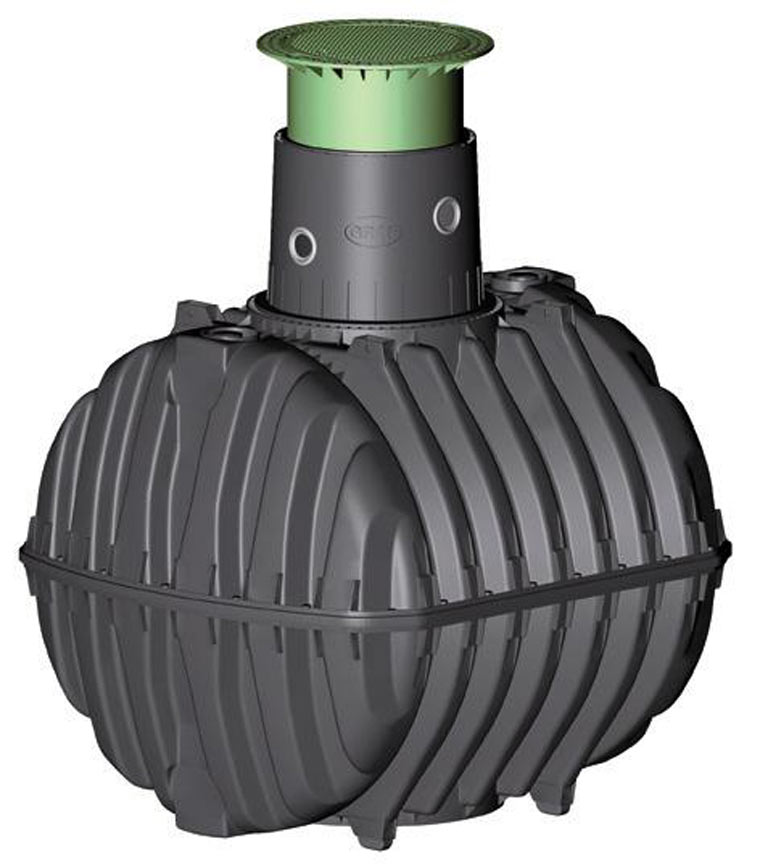Graf Plastics GmbH, at its Teningen plant (fig. 1) manufactures its large-volume Carat underground tanks (fig. 2) for rainwater utilization.The manufacture of the containers ranging up to 6,500 litres produces waste, which is reduced in a single phase to mill material using a WLK 30 Super-Jumbo single-shaft shredder from WEIMA Maschinenbau GmbH in Ilsfeld.

Fig.1: Graf plant Teningen
Rainwater utilization becoming considerably more economic
The utilization of rainwater for the WC, the washing machine or watering the garden can help to save valuable drinking water and other expensive sewage fees. Constantly increasing costs here have led in recent years to extremely increasing worldwide demand for containers for collecting and storing rainwater, installed above or below ground. Filters installed in the entire system enable a 100 per cent water yield. This will enable a household to save up to 50 per cent of its drinking water needs.
Synthetic with clear advantages over concrete
In comparison with concrete tanks, synthetic tanks with a capacity of up to 6,500 litres can be installed without the need for a crane due to their significantly lower weight – thus saving the relevant handling charges. Manufactured in the form of a half-shell, stacked conveniently on pallets for onward transport, the tanks can then also be exported cheaply and the final assembly carried out on location.
Graf Plastics commissioned in October 2006 one of the world’s largest two-pallet injection moulding machines with a clamping force of 5,500 tons and which can process 150 kg of material in one go. This machine is used to spray tank halves, which have a statically optimized tank shape by plastic welding to one another. The manufactured tanks (fig. 2) are therefore permanently sealed and designed in such a way that they can be completely installed in the ground.

Fig. 2: Carat tank with walkable telescopic dome
Smooth tank insides prevent dirt deposits, thus enabling high water quality and easy tank cleaning. The tanks offered are extremely durable and can be recycled after use.
Central grinding in order to secure optimal quality
The company gives a 25-year warranty on its tanks. This is made possible by optimized production processes and a comprehensive quality management, which make it possible to guarantee a constantly high-quality product. Each individual tank is checked with regard to dimensional accuracy, wall thicknesses and weight. The products that do not meet the high quality demands will be discharged and forwarded to central processing.
In a hall section separate from the rest of the production, the containers are collected in such a way and fed to the WLK 30 Super-Jumbo single-shaft shredder installed here (fig. 3) as and when required.

Fig. 3: WLK 30 Super-Jumbo single-shaft shredder
Task-specific design of the shredding machine
The machine is fitted with a fully-sealable hopper on the top of the machine housing. Two folding doors on one side enable opening and thereby access to the rotor. The materials are supplied from the full tanks or several half-shells via this opening by forklift truck. On safety grounds, the machine will only run if the doors and the access to the hopper are fully sealed. The material now in the cutting chamber that has been extended compared with the standard design is pressed via a horizontal, raised and load-dependent-controlled feeder in the machine room against the also horizontal rotor and shredded there between the rotor and the stator blades. The feeder is fitted with a toothed disk (fig. 4) for the optimal engaging of the generally large volumes of the material and is guided over a segmented machine flooring ensuring an optimal valve guide.

Fig. 4: Toothed disks on the horizontal feeder
A side-mounted hydraulic pusher system above the feeder, in addition, pushes the material vertically from up to down thus preventing any “dancing” of the very bulky tanks on the rotor. The shredded material is discharged through a filter below the rotor with a mesh aperture of 10 mm. The aim is a low-dust mill material with a granularity of ca. 8-10 mm (fig. 5).

Fig. 5: Mill material with a granularity of ca. 8-10 mm
Fast cleaning and simple servicing
The single-shaft shredder built on an anti-vibration baseplate has a rotor length of 3,000 mm and a rotor diameter of 600 mm from the fully machined, profiled and universal V rotor (fig. 6). The power rating of the ca. 36 ton machine is 2 x 90 kW. The filter is held by a hydraulically swiveling screen basket enabling fast access to the rotor and thus a fast and full cleaning of the machine, which is in particular carried out when the material is changed.

Fig. 6: Profiled V rotor with multi-use cutting blades with an edge length of 60 mm x 60 mm
The edge length of the multi-use cutting blades is 60 mm x 60 mm. The blade will be changed when the dust level rises or if the through-put sinks considerably.
The size of the shredding machine is determined by the size of the containers to be shredded. The achievable through-put is thereby of subordinate importance. The tanks are manufactured round the clock 365 days a year in a three-shift operation whereby of course only a fraction of the treatment capacity is used.
Gerd Berkenkamp, Plant Manager:
“WEIMA Maschinenbau GmbH offers a convincing concept with an acceptable price/performance ratio. The reasonable delivery time was also an important criterion. The geographical vicinity of both companies enables fast intervention if servicing is required.”
Graf Plastics GmbH has been producing high-quality synthetic products for over 45 years. Synthetic products were originally mainly manufactured for wine production. Compost and compost containers for industry have however also enabled continuous growth. The company developed products for rainwater utilization as early as 1974 and is currently considered one of the world’s largest producers. Graf currently employees around 250 staff at both plants in Teningen (Baden) and Dachstein (Alsace).
Graf Plastics GmbH
Kontakt: Gerd Berkenkamp, Werksleiter
Carl-Zeiss-Str. 6
D-79331 Teningen
Tel. +49 (0)7641/589-823
berkenkamp@graf-plastics.de
www.graf-plastics.de